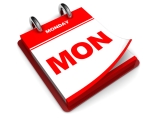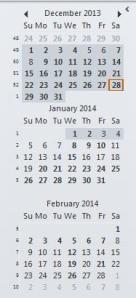I realize we nickname Monday with a lot of slang talk…
 It’s a blue, manic, and “on no it’s Monday” Monday…. In the season, it’s known as “Monday Night Football” night and people go crazy staying up later than normal just to indulge. And, tonight is the first Presidential Debate between the two parties candidates.
It’s a blue, manic, and “on no it’s Monday” Monday…. In the season, it’s known as “Monday Night Football” night and people go crazy staying up later than normal just to indulge. And, tonight is the first Presidential Debate between the two parties candidates.
Why did they plan the debate on the same night as the NFL’s premiere night game? Go figure. I can just hear the Mama’s and the Papa’s singing:
Monday, Monday, can’t trust that day
Monday, Monday, sometimes it just turns out that way
For many church leaders it’s the day we analyze what worked on Sunday, and what needs to be improved. We question why so-and-so did not make it to church, or why the church wasn’t ready without a last moment refresh or change of routine.
Why Monday? What does it mean? Essentially, and this is found in many cultures over the centuries, this first day of the week was represented by the Moon. It makes sense that it would migrate from Moon Day to Monday over time. However, depending upon the time period, culture, country, or language, any one of our 7 days could be known by any other word.
It’s a rather unique study to determine why we call the days and months by their names we accept as normal. Back in the 1980’s there was an International Organization for Standardization (ISO) that had a main focus for standardizing words and meaning between different countries, languages and cultures.
The purpose of this standard is to provide an unambiguous and well-defined method of representing dates and times, so as to avoid misinterpretation of numeric representations of dates and times, particularly when data are transferred between countries with different conventions for writing numeric dates and times.
(Click here for more info)
Their focus was standardization, but here in America we still struggle with old measurement systems and the new standards. Maybe we’ve simply accepted this as normal, but I still struggle with understanding the “liter” size of engines, when, and this is surprising, we never understood the “cubic inch” or “horse power” denotation of engines of yesteryear. Our speedometers are at least giving us tools to convert between one standard and the other… Go ahead. Think about it for a moment. With a switch, many dashboard components can display in “standard” or “metric”, at the very least there are both numbers preprinted and the sweep of the display hand an help you read kilometers or miles per hour.
For those who hesitate to call the days of week, or months of the year, by any given name, it is simply the First Day, or First Month. First day of the work week, or First day after the weekend… Why do this? Some do not want to give reference to some medieval time or god to use for the title of a specified time period. Some believe it is giving credence to a false god.
A side note of interest, many cultures still have their New Year celebration at various times that do not equal the 365th day of a year that begins with January 1. The Jewish, Muslim and Chinese New Year celebration are based on a Lunar cycle, and not a Solar cycle.
But why do we struggle with this first day so much? It’s often that the weekend is over and work begins. At least according to many folks working schedule. Retail and tech and other fields of labor often work 7 days per week, and some have shifts covering 24 hours per day. For those that count Monday as their first working day of the week, then it’s after the ending of the weekend when their time off may have been more liberally relaxed – and now it’s back to the grind.
In our culture, Sunday is the ending of the week, although many calendars have it as the First Day of the week. When we retell the Creation events, Sunday is the 7th day, and on this day God rested from all his work.
Thus the heavens and the earth, and all the host of them, were finished. And on the seventh day God ended His work which He had done, and He rested on the seventh day from all His work which He had done. Then God blessed the seventh day and sanctified it, because in it He rested from all His work which God had created and made. (Genesis 2:1-3 NKJV)
For me, I try to make Monday a slow day of recovery. Sunday is my hardest work day. My business is God and that is a 7/24 life, but our corporate gathering is Sunday morning and I strive to make sure we are ready for the Worship and Word celebration.
Back in the day of bi-vocational pastoring, Monday was typically like everyone else. My recovery was slower, and the week felt longer! The closer I get to retiring years, the more I realize that it matters little what day of the week it is… It simply takes longer to recover….
How about you?



You must be logged in to post a comment.